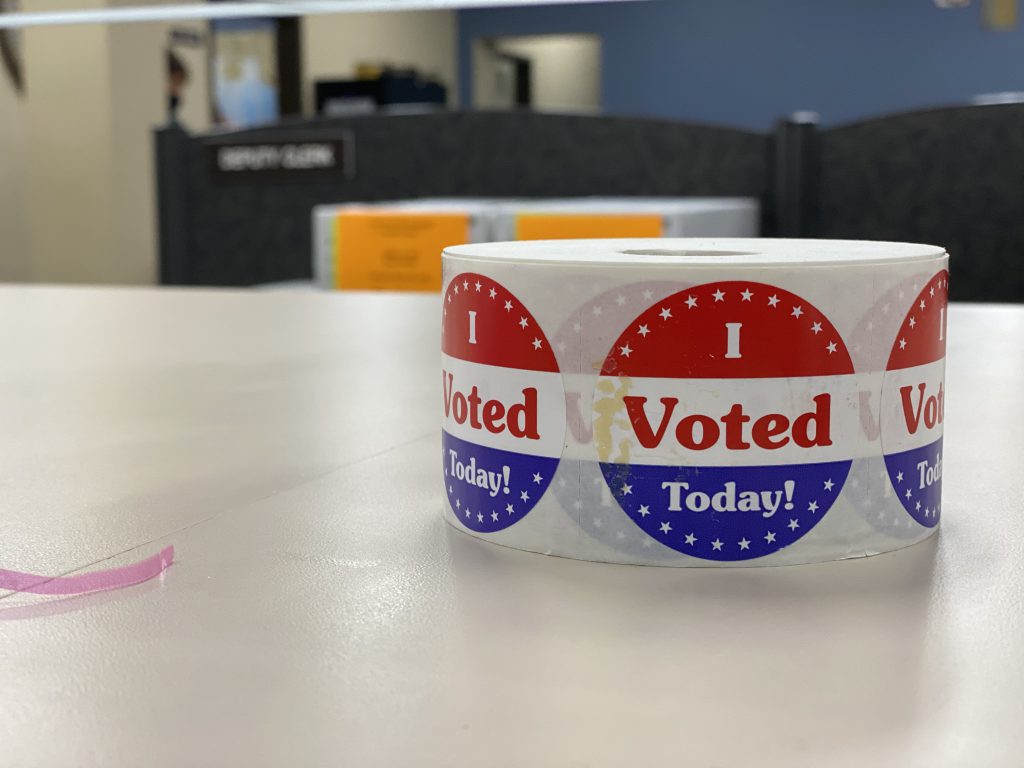Washington County, WI – Here’s a maxim to remember: no level of government has any money unless it comes from “we the people” as taxpayers. That means we ought to care about how our money is being spent and who is spending it. That’s the essence of the two referenda questions on everyone’s ballot for this fall partisan primary.
Election Day is Tuesday, August 13, but early in-person voting is going on right now statewide, ending in most communities this Friday, August 9. Absentee ballots have been being mailed out and returned to clerks either by mail or in person for several weeks. In other words, this primary election is well underway.
All voters need to check their sample ballot at myvote.wi.gov to make sure they are prepared to cast a knowledgeable and responsible vote. What a check of one’s sample ballot for this election will reveal is that on every ballot across the state are the two referenda questions.
These binding, state-constitution-amending questions got on the ballot because the Republican-led state legislature passed in two consecutive legislative sessions a joint resolution dealing with the issues expressed in these questions. This approach bypasses the governor’s veto pen and ultimately lets the voters determine whether we amend our constitution.
Power of the Purse & Power of the People
The two referenda questions came about because of the billions of federal dollars that came into our state during Covid. Governor Evers decided the law allowed him to have complete control of that money, determining, with absolutely no legislative input or oversight, who got the money and how much. As a result, the funds went to the governor’s friends—like Planned Parenthood of Wisconsin—ostensibly for “relief” during the virus outbreak.
The state legislature passed bills to restrict what the governor was doing and to re-direct the money, but the governor vetoed all such bills, not surprisingly. Hence, this approach to amend the state constitution.
So here is the first question—and this is the exact wording on the ballot:
QUESTION 1: “Delegation of appropriation power. Shall section 35 (1) of article IV of the constitution be created to provide that the legislature may not delegate its sole power to determine how moneys shall be appropriated?”
In layman’s language, this question is asking if we should amend the state constitution to make it clear the state legislature cannot delegate to someone else or to some other agency or some other office or to some other branch of government its power to determine how state money is spent?
A yes vote on Question 1 means you want to amend the constitution to ensure the state legislature never delegates its power to determine how money is spent to someone else or some other entity.
A no vote on Question 1 means you are fine with the state legislature delegating its constitutional authority on how money is spent to someone else or some other entity.
Question 2: “Allocation of federal moneys. Shall section 35 (2) of article IV of the constitution be created to prohibit the governor from allocating any federal moneys the governor accepts on behalf of the state without the approval of the legislature by joint resolution or as provided by legislative rule?”
This referenda question is asking if we want to amend the state constitution to make sure that if a governor of Wisconsin accepts federal money—taxpayer money—on behalf of our state, he or she must get legislative approval before spending that money.
A yes vote on Question 2 means you want to amend the state constitution to make sure a governor has to have legislative approval on how any federal money is spent that he or she accepts on behalf of the state.
A no vote on Question 2 means you are ok with a governor being able to decide completely on his or her own how federal money is spent that the governor has accepted on behalf of the state. You don’t want the legislature to have to approve how that money is spent.
This is your money at the heart of these referenda questions. But what’s also at stake is about where the power to spend your money lies—with one person who sits in the governor’s office or with the collective decision of one hundred thirty-two elected representatives and senators.
Be sure you know the truth about these referenda questions because from what I’m seeing and hearing lots of lies are being told. Get informed, share what you know, and be sure you make your voice heard through your vote.
Julaine Appling
Executive Director of Wisconsin Family Council
WCI COMMENTING RULES OF ETIQUETTE:
While open and honest debate is encouraged here, Washington County Insider asks that you comply with the following rules for posting. Those who do not comply will have their posts removed which may result in being banned from commenting.
Washington County Insider will not publish comments that:
- Are considered likely to provoke, attack, or offend others. This is known as “trolling.” Trollers know when they are trolling, and so do we. *See definition of “troll” below. If you notice a few consistent blog trolls disappear, you’ll know why.
- Are sexually explicit, abusive, or otherwise objectionable.
- Contains inappropriate or vulgar language that is likely to offend.
- Break the law or condone or encourage unlawful activity. This includes breach of copyright, defamation, and contempt of court.
- Advertise products or services for profit.
- Are seen to impersonate someone else.
- Repeatedly post the same or similar messages (‘spam’)
- Include personal contact details such as telephone numbers and postal or email addresses.
- Include a link or photo that has not been approved by the editor prior to posting.
- Are considered campaigning. See also “trolling” above.
- Are unrelated to the topic.
NOTES:
- Just because your comment doesn’t show up right away doesn’t mean you’re being censored. When you post a comment it must first go through our filtering software. If it fails, your comment goes into a queue for manual approval.
- Just because a comment or advertisement is on the site, doesn’t mean WCI endorses it.
- The above rules are not intended to stop criticism or dissenters, but rather to stop those who are incapable of participating in a civilized manner.
*Trolling: a troll is a person who sows discord on the Internet by starting arguments or upsetting people, by posting inflammatory,[1] extraneous, or off-topic messages in an online community (such as a newsgroup, forum, chat room, or blog) with the intent of provoking readers into an emotional response[2] or of otherwise disrupting normal, on-topic discussion,[3] often for the troll’s amusement. (source: Wikipedia)
All letters must include a US Postal address and direct cell/phone number for record keeping.







